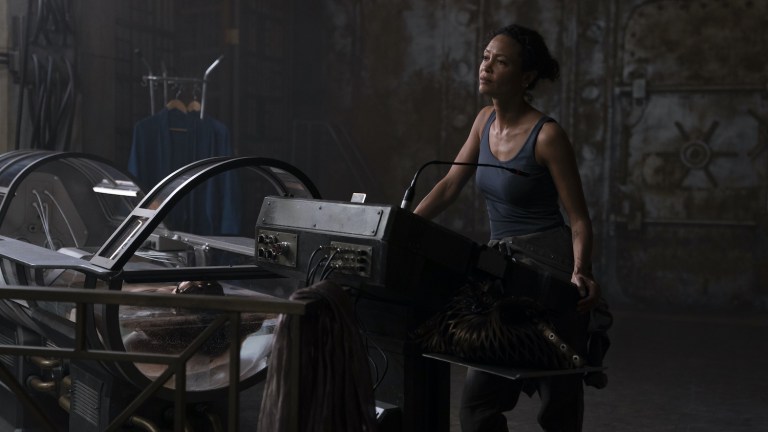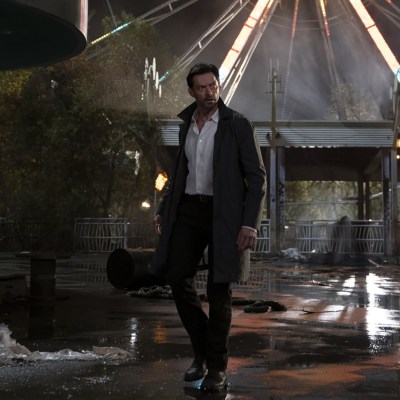Why Reminiscence and Westworld’s Sci-Fi Futures Feel So Real
Lisa Joy and Thandiwe Newton discuss building the sci-fi nightmares that feel inevitable in Reminiscence and Westworld.

Lisa Joy has always been skeptical about notions of objective truth. She’s even second guessed her own memory on how key moments in her life occurred. Such admissions suggest a remarkable sense of awareness and perspective. It also marks a canny instinct for creating compelling visions of our collective future… even if we’d rather not personally go to such places.
Both Westworld, the HBO television series she co-created with writing partner and spouse Jonathan Nolan, and Reminiscence, which marks her feature film debut as a writer and director, are layered in ambiguity and the dawning realization that the world is not how we think it appears. In the case of Westworld that comes in the form of robots realizing they’re trapped in preordained loops; in Reminiscence, it is the humans themselves who must confront their own delusions, particularly the ones we tell ourselves about the past.
In the new movie, Hugh Jackman plays Nick Bannister, a man who peddles fantasies for future Americans after generations of war and climate change have left coastal cities like Miami and New Orleans on the brink. As the water literally rises around his feet, Nick and his customers get lost in imaginary yesteryear via technology that allows them to relive any memory, no matter how distorted. It’s a grim scenario that makes the robot revolution look cuddly by comparison.
Yet when we sit down to talk with Joy, she admits she really is as nostalgic as Nick: She just recognizes the lie within her reveries.
“I consider myself somebody who’s very skeptical of the objectivity of the narrator, even if I am narrating my own story,” Joy says. “Is that how it really happened or have I varnished the story over time or changed it based on the retelling? So I’m always really concerned with what was the objective truth of a memory and am I close to it or has it become corrupted?”
The concern with unreliable narration is perhaps why Reminiscence works so effectively as noir. If Westworld gave a sci-fi sheen to the black and white tropes of old Oaters, then Reminiscence inhabits the moral grayness of film noir. Joy even cites Out of the Past (1947) and Alfred Hitchcock’s Vertigo (1958) as touchstones on her own vision of the future. But just as important as the ghosts of the past are the people in this moment telling their story—and thereby making new memories.
Unlike her director, Thandiwe Newton does not consider herself a nostalgic person. For the Emmy winning actress, nostalgia is the memories you obsess over because you weren’t mentally present when they occurred. And she tries to always be present for the memories she knows she’ll care about: time with her children, mainly, and fleeting moments of family.
“Everything else is not real,” Newton says. Yet she also is clearly present for relationships that matter to her, including Joy. Before being cast as Watts in Reminiscence—the assistant and former war buddy of Jackman’s character—Newton worked with Joy on Westworld, the series which won her that Emmy. And the actress paints a very vivid memory of their first meeting over a FaceTime call which was initially supposed to be just with Joy’s husband and Westworld co-writer, Jonathan.
Says Newton, “The first time we met I was breastfeeding my son, Lisa was breastfeeding her daughter. I was [initially] on FaceTime with Jonah… So we’re having such a great conversation that goes on for such a long time, and I’m like, ‘I’m so sorry, can I just bring my baby?’ So my husband brings my baby and I start breastfeeding, and literally off-camera, Lisa pokes in and says, ‘Oh, I’m here, actually, with Zoe and we’re breastfeeding!’ And I’m like, ‘Woah!’ So it ended up being me and Lisa, lactating together, talking and I’m like I’m in! I’m in, Westworld, I’m in.”
For Newton the moment crystallizes why Joy’s storytelling has such candor and prescience. Says Newton, “I give that example because it shows you we’re both aware of being a woman in this industry and what we present at face value… and right at the beginning of our relationship, we exploded that stereotype, and that’s what she and I have been doing ever since, exploding stereotypes.”
It’s also perhaps why Newton was eager to join Joy in Reminiscence for a role that’s miles from Westworld’s Maeve, a robot initially scripted to be a seductive saloon madam who’s turned into a ferocious freedom fighter. By contrast, Reminiscence’s Watts is simply a fighter, and even a sharpshooter who turns out to be far more ruthless than Jackman’s Bannister. The actress reveals to us they incorporated her own real-life capacity for sharpshooting into the role.
“Of course, I’m a great shot,” says Newton. “Every time I’m at the shooting range, I’m the one who [hits the target] every single time. And I couldn’t care less about being a good shot. In fact, it’s an embarrassment to me, I don’t want to be a good shot. I hate violence, I despise guns. But it’s ironic that one of the best scenes I’ve ever been in, in my life, was the scene where [Watts saves] Bannister’s life. I’m a badass in that scene! And yeah, I don’t like violence, but with me and Lisa Joy, it’s a whole other thing.”
Of course that dash of violence and spectacle is in service to a vision for a future rooted in the greater dissolution of American society. This is presented as the legacy of climate change, and it feels far scarier than the menace of robot cowboys taking to the streets.
Says Joy, “On Westworld, I have so much to be paranoid about in my work. Sometimes it’s the AI apocalypse and sometimes it’s nature smiting us [in Reminiscence]. I do think though it doesn’t take much of a prophet to understand the problem with global warming and the repercussions it will likely have on our lives. So the reason it’s presented as almost a backdrop to all the action in the film is because I think it’s time we just accept this is happening, and the question isn’t, ‘Is it going to happen?’ but ‘how will we adapt? How will we deal with what’s coming down in the future towards us?’”
Daniel Wu, who plays Saint Joe in a short but pivotal scene in Reminiscence, had long conversations about exactly that with Joy. While his character has brief screen time, the New Orleans drug lord represents an ugly possible outcome of the American experiment if things continue on their current path.
“In the dialogue there’s a little bit of where Joe says to Bannister, ‘Your kind were drafted, but people like me were interned, put in camps,’” Wu recalls. “So we talked about a civil war happening and something racial happened with racial trauma, where I was put in an internment camp and that created a serious chip on this guy’s shoulder but also created this serious need to survive. So after he got out of those camps, he then slowly grows up in the ranks of the underworld of New Orleans and became this drug dealing kingpin.”
It’s a dark vision for the future, one which Joy seems to suggest could be inevitable if we continue to be so backward-looking, including to the point of embracing the racism and hate of previous centuries. Considering Westworld itself is also a series where rich elites attempt to travel back to the “good ol’ days” via elaborate theme parks, it’s worth wondering if Joy thinks we’re already doomed with crippling nostalgia as a society?
Says Joy, “I feel like what makes me more nervous is an inability to look back at a shared past. The way in which we’ve become so siloed in our experiences, and the way in which we consume media and news, and even history, the way we learn about it, that we’ve each begun to craft our own subjective narrative about history and the world. And I think that’s very, very dangerous.”
Nevertheless, the artist tries to add a silver lining, particularly in regard to how art can help bridge gaps when all else fails.
“I [have] so many cautionary tales about the future, but there is a thing that makes me optimistic,” she says. “And that is that even though we’re siloed in so many ways, and we can refute and feel immediately antagonistic to certain thoughts or concepts when we start discussing them, I think one of the greatest bridges that people have and cultures have is the arts. Because it gives you a story and allows you to live it fully in the same way that others experience it when you read from the first page to the last, or when you’re in the movie theater watching from the first moment to the last. People may draw different conclusions, but music, arts, movies, those become the touchstones of a shared cultural identity. And that to me is very important in keeping the fabric of a society healthy.”
Reminiscence is in theaters and on HBO Max on Friday, Aug. 20.


